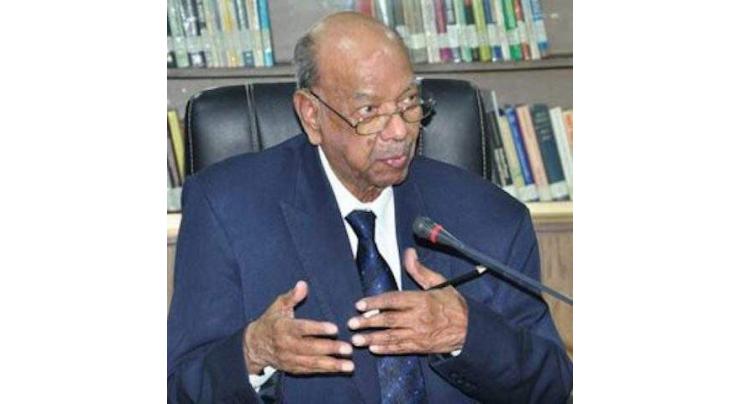
Pakistans Economic Journey: Need For A New Paradigm: Experts
Faizan Hashmi Published March 01, 2019 | 03:42 PM

Experts at the launch of the third revised edition of Pakistans Economic Journey: Need for a New Paradigm authored by Fasih Uddin, former chief economist of Pakistan, pinpointed governance failure as the root cause of all economic troubles of Pakistan
ISLAMABAD (UrduPoint / Pakistan Point News / NNI - 01st March, 2019) Experts at the launch of the third revised edition of Pakistans Economic Journey: Need for a New Paradigm authored by Fasih Uddin, former chief economist of Pakistan, pinpointed governance failure as the root cause of all economic troubles of Pakistan.Published by IPS Press the publishing arm of Institute of Policy Studies (IPS) the books earlier two editions were co-authored by Akram Swati in 2006 and then in 2009.
Its third and latest edition has come out almost after a decade of hard work by the veteran economist. Its Chinese version has also been published earlier by Pakistan Study Centre, Sichuan University, Chengdu.Introducing his book on the occasion the author said that over the years Pakistans economy has grown and diversified, infrastructural facilities expanded and positive steps taken on many fronts, yet the performance is neither fast enough (like some comparable economies) nor up to its potential; it neither reflects the ideological objectives of the creation of the country.
A lot of ground is yet to be covered for which a new approach needs to be evolved.Fasih Uddin said that the vision of developing an Islamic, just, equitable, progressive and prosperous nation' as enunciated by the Father of the Nation, requires an integrated and comprehensive paradigm.
Such a paradigm is presented as the panacea for all ills in this book in a simplified manner.The event was chaired by Saeed Ahmad Qureshi, former secretary-general finance & revenue, and addressed by Khalid Rahman, executive president IPS, Dr Waqar Masood Khan, former finance secretary, Dr Tahir Hijazi, vice chancellor, Muslim Youth University, and Dr Abdul Saboor, dean, Faculty of Social Sciences, PMAS Arid Agriculture University, Rawalpindi.
Qureshi viewed that ever since its independence, Pakistan was plagued with issues of inefficient governance and the results were duly reflected on the state of the countrys economy.
He mentioned various aspects pointed in the book where the inadequacy of governance was proving to be fatal for the country.Terming that the systems in place in the country were chronically insufficient, inefficient and favoring the powerful, Dr.
Masood saw administration and provision of justice as the key area to focus upon in order to improve governance, and consequently the economy.Dr Hijazi highlighted various economic issues where the quality of governance was the at the heart of the problem.
He presented the cases of energy production, water depletion, and agriculture as examples where the lack of vision and research work were depriving the country from adopting the available viable solutions.Dr Saboor said that the book delivers important policy messages in between the lines, alongside detailing many areas that need urgent attention for the country's economic uplift.The speakers lamented that while the economic issues highlighted in the book were very much true in case of Pakistan, their solutions were very much available in the teachings of economic and social justice provided by islam.
It was unfortunate however that people in the policy circles lack desire to benefit from a faith-based framework.The panelists commended the author for his wonderful work, maintaining that there were very few books covering the economic picture of Pakistan in such perceptive detail, and terming the book an academic treasure that economic researchers and students in the country could equally benefit from.
NNI
Related Topics
Recent Stories

Interior Minister starts Margalla Trail Patrol for security

Currency Rate In Pakistan - Dollar, Euro, Pound, Riyal Rates On 26 April 2024

Today Gold Rate in Pakistan 26 April 2024

ICC Womens T20 World Cup Qualifier, Match 2: Ireland Women open with Comfortable ..

Robinson, bowlers help New Zealand go 2-1 up against Pakistan

Shahzeb Chachar to hold khuli kachehri on April 26

Heatwave amid Israel's aggression in Gaza brings new misery, disease risk

Tourism must change, mayor says as Venice launches entry fee

Court adjourns Judicial Complex attack case till May 17

Nasreen Noori’s book ‘Popatan Jahra Khwab’ launched

Wafaqi Mohtasib inspection team visits Excise and taxation office

AJLAC announces 5th Conference titled ‘People’s Mandate: Safeguarding Civil ..
More Stories From Pakistan
-

Interior Minister starts Margalla Trail Patrol for security
2 minutes ago -
Speaker NA directs ministries to ensure their officials' presence in the house
19 minutes ago -
Senior journalist Waseem Shehzad robbed
28 minutes ago -
Commissioner for strict action against parents over not administering polio vaccine to kids
29 minutes ago -
By-poll of Tehsil Council Chairmen KP on Sunday; 783772 to cast vote
1 hour ago -
Naval Chief participates in 19th Western Pacific Naval Symposium in China
12 hours ago
-
Int'l symposium addresses capacity building for safe, environmentally sound ship recycling in Pakist ..
12 hours ago -

Shahzeb Chachar to hold khuli kachehri on April 26
13 hours ago -

Court adjourns Judicial Complex attack case till May 17
13 hours ago -

Nasreen Noori’s book ‘Popatan Jahra Khwab’ launched
13 hours ago -

Wafaqi Mohtasib inspection team visits Excise and taxation office
13 hours ago -

AJLAC announces 5th Conference titled ‘People’s Mandate: Safeguarding Civil Rights in South Asia ..
14 hours ago





